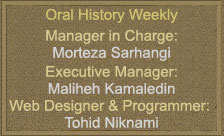| No. 299 | 7 May 2017 |
Visiting Director of Ashrafi Publication in the Session of "Oral History of Book"I Advertised in Newspapers for Introducing BookAccording to Iranian Oral History Website the third session of new term of sessions titled "Oral History of Book" was held with effort of Nasrollah Haddadi, author and researcher, in Khaneh Ketab Institutions Saraye Ahl-e Ghalam. The meeting hosted Abolghasem Ashrafolkottabi, one of protagonists of publication field, on Wednesday April 26, 2017.Interview with Abbas Raisi Bidgoli, Author of Memories about Martyr Hossein-Ali FakhriAn Interviewer without Question is like an Unarmed SoldierAbbas Raisi Bidgoli, one of Sacred Defense fighters, is working a few years on memory writing in field of Sacred Defense. "Amo (Uncle) Hossein", includes memories of martyr Hossein-Ali Fakhri which was released into the market in 2016, is his first work. Publishing the book became an excuse in order to Oral History Website interview with him. Result of interview with Abbas Raisi Bidgoli is memory writers and enthusiasts of memory writing to be more familiar with his method in writing the book and other his works that are writing and publishing.Oral History Interview & Importance Part 4Narrator Identification & SelectionAs discussed before, oral history is a participatory process in history development so that different information concerning political, cultural and social events are recorded and published in a targeted interview. It is important since the perspectives and narrations of a number of people are gathered in recording historical events.Research & Targeted Questions in Oral History InterviewsOral history interviews are means of collecting information. It is through interviews that historians in this type of historiography receive information from the interviewee. The interviewees are sources of various types of information; however, the interviewer is interested only in a specific type of data. Hence, the interviewer has to employ systematic strategies to manage and steer the interview. Oral History Weekly Magazine Aims and Regulations
Oral History Weekly Magazine wishes to create a suitable place for thoughts and idea development; Its main field would be “Oral History” and subjects as telling & writing memoirs, writing diaries, travelogues, chronologies, and all other subfields of history which are presented in the form of news, articles, reports, notes, interviews and memoirs can be included. There is no limitation on the length of would-be-sent materials. Mentioning the name, academic background and email is necessary. Articles with complete references and bibliography are more credited and an abstract would quite helpful. Weekly is not about to publish any material consisting insults and libels about other people or anything that brings anxiety to public opinion. Weekly can edit and translate the received materials. The published articles and materials are only the writer’s ideas and Oral History Weekly Magazine has no responsibility about their content. |
 Seyyed of Quarters 15 (28) Memories of Iranian Released POW, Seyyed Jamal Setarehdan Edited and Compiled by: Sassan Nateq Tehran, Sooreh Mehr Publications Company 2016 (Persian Version) Translated by: Zahra Hosseinian A few days later the camp commander came. He had brought a Quran and a few Turbahs. "I am Shiite like you." he said, "I bought this Quran and Turbahs with my own money. I have given Quran and Turbahs to other quarters too. I am sorry, I could not do more than this."    |
